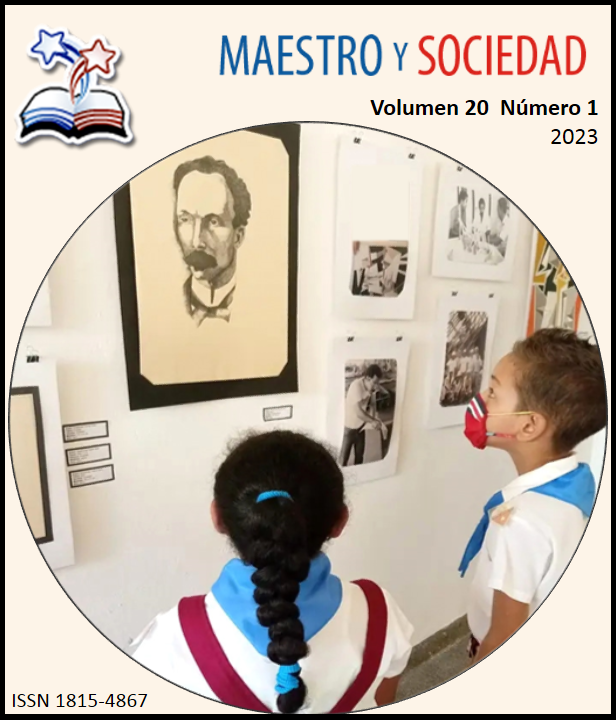Continuous training as a process of updating the university graduate
Continuous training as a process of updating the university graduate
Keywords:
continuous training, graduate follow-up, university-companyAbstract
Introduction: Continuous training processes respond to social needs and the possibility of raising the training performance of university graduates, having to provide transformations that respond to the changes that society imposes.
Materials and methods: This work is a descriptive research with a qualitative approach that aims to characterize the continuous training process of Engineering graduates in the university-company link. The analysis-synthesis methods and the documentary review allow us to exalt the relevance that is granted to the continuous training.
Results: It is a priority of the universities to search for excellence in the educational field and in the design of tools that allow the systematic monitoring of the continuous training of graduates in the face of the accelerated changes in society, as an integrating function of the acquired knowledge, the skills and values that are continuously formed to achieve greater specialization.
Discussion: The university is the institution created by society with the objective of generating, transmitting and disseminating knowledge through interrelated actions to obtain the results that society requires, and to strengthen the university-business link.
Conclusions: The process of continuous training according to the needs of the environment in which the graduate lives and develops is a concern of all time, which is specified in training a professional that meets the demands of contemporary development.
References
Arteaga, S. (2005). Modelo pedagógico para desarrollar la Educación para la Paz centrada en los valores morales en la escuela Media Superior Cubana. [Tesis de doctorado. ISP Félix Varela].
Bernaza Rodríguez, G. J., Aparicio Suárez, J. L., de la Paz Martínez, E., Torres Alfonso, A. M., & Alfonso Manzanet, J. E. (2020). La educación de posgrado ante el nuevo escenario generado por la COVID-19. Educación Médica Superior, 34(4). http://scielo.sld.cu/scielo.php?script=sci_arttext&pid=S0864-21412020000400015
Cepal, N. U. (2018). Agenda 2030 y los Objetivos de Desarrollo Sostenible: una oportunidad para América Latina y el Caribe. https://www.un.org/sustainabledevelopment/es/education/
Diaz-Canel Bermúdez, M. (2020a). Gestión de gobierno, educación superior, ciencia, innovación y desarrollo local. Rev retos, 14(2). http://scielo.sld.cu/scielo.php?script=sci_arttext&pid=S2306-91552020000200005
Diaz-Canel Bermúdez, M., Alarcón Ortiz, R., &SaboridoLoidi, J. R. (2020b). Potencial humano, innovación y desarrollo en la planificación estratégica de la educación superior cubana 2012-2020. Revista Cubana de Educación Superior, 39(3). http://scielo.sld.cu/scielo.php?script=sci_arttext&pid=S0257-43142020000300001
Fuentes, H. C (2011). La formación en la educación superior desde lo holístico, complejo y dialéctico de la construcción del conocimiento científico. Universidad de Oriente.
García, M. (2018). La formación profesional de los estudiantes de la licenciatura en educación preescolar para la orientación educativa. [Tesis de doctorado. Universidad de Oriente].
Martínez Gil, L. (2012). Sistema de gestión de la relación universidad-empresa. Una estrategia para su implementación en la Universidad de Pinar del Río. [Tesis de doctorado. Universidad de Pinar del Río" Hermanos Saíz Montes de Oca"]. https://rc.upr.edu.cu/jspui/bitstream/DICT/1810/1/Lisbet%20Mart%c3%adnez%20Gil.pdf
Morales, F., Aldana, J., Sabogal, F. & Ospina, R. (2008). Generando orgullo areandino. Boletín Proyección Social & Egresados, (Fascículo 2). http://www.itzitacuaro.edu.mx/residencias/archivos/1993.pdf
Resolución 138. (2019). Ministerio de Educación Superior. http://webcache.googleusercontent.com/search?q=cache:K4PfAtY9QucJ:www.umcc.cu/wp-content/uploads/2020/06/Resoluci%25C3%25B3n-No.138-2019-Formaci%25C3%25B3n-continua.doc&cd=1&hl=es&ct=clnk&gl=cu
Resolución 140. (2019). Gaceta Oficial No. 65 Ordinaria de 2019. Ministerio de Educación Superior. https://www.gacetaoficial.gob.cu/es/capacitaci%C3%B3n
Ley No. 116, Código de Trabajo. (2020). Gaceta Oficial. https://www.gacetaoficial.gob.cu/es/ley-no-116-codigo-de-trabajo
Sarramona, J. y Pineda, L. (2002). La formación continua laboral. Biblioteca Nueva.
Téllez-Lageyre, A., Bravo-Rodríguez, Á., Martínez, R. L., & Rodríguez-Fajardo, J. (2019). Vigencia del pensamiento pedagógico de Fidel Castro en la formación continua del maestro primario. Maestro y Sociedad, 3-11. http://maestroysociedad.uo.edu.cu
Velásquez, A. L., Duarte, J. D., Ríos, J. A. F., &Taborda, C. (2010). El vínculo universidad-egresado: una acción socialmente responsable. http://www.chubut.edu.ar/descargas/secundaria/congreso/EIC/RLE2401_Lopez. pdf.
Villazón Chaviano, K. C. y Hidalgo Cano, Y. (2006). Diseño y validación de un programa de formación continuada a los profesionales de la salud para el tratamiento del VIH/SIDA. http://dspace.uclv.edu.cu:8089/handle/123456789/2846
Downloads
Published
How to Cite
Issue
Section
License
Copyright (c) 2023 Ariagna Fernández Sanabia, Nadia Barrabí Guardiola, Lizette de la Concepción Pérez Martínez

This work is licensed under a Creative Commons Attribution-NonCommercial-NoDerivatives 4.0 International License.
This journal provides immediate open access to its content, based on the principle that offering the public free access to research helps a greater global exchange of knowledge. Each author is responsible for the content of each of their articles.



























 Universidad de Oriente
Universidad de Oriente 